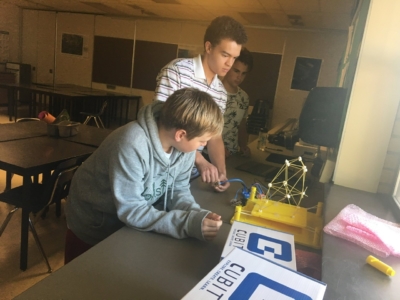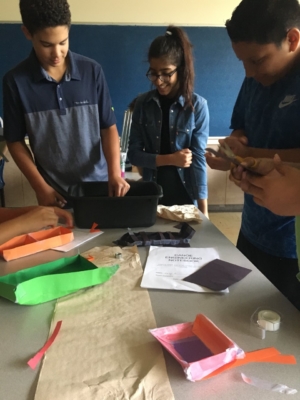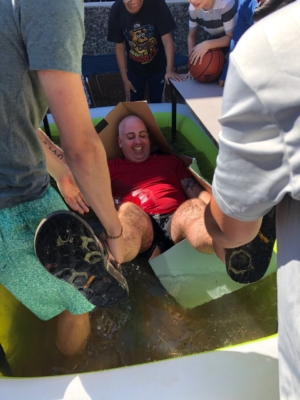 Beaverton School District provides a comprehensive career and technical education (CTE) summer school program for migrant students and English-language learners (ELL) in middle school. The program began six years ago. And it continues as part of an ongoing partnership with Portland State University (PSU). Beaverton, nestled outside of Portland, serves approximately 41,000 students. It is one of the most populated school districts in Oregon and also one of the most diverse. Students within the Beaverton School District speak more than 101 different languages. District personnel identified a significant need for strong ELL programs.
Beaverton School District provides a comprehensive career and technical education (CTE) summer school program for migrant students and English-language learners (ELL) in middle school. The program began six years ago. And it continues as part of an ongoing partnership with Portland State University (PSU). Beaverton, nestled outside of Portland, serves approximately 41,000 students. It is one of the most populated school districts in Oregon and also one of the most diverse. Students within the Beaverton School District speak more than 101 different languages. District personnel identified a significant need for strong ELL programs.
CTE engages all students in hands-on learning.
“We needed a strong hook for these students to commit four weeks of summer to practice their language and math skills,” said Jeffrey Crapper, a high school CTE teacher and summer school coordinator in Beaverton. “CTE provided an amazing opportunity for our students to apply their learning using an hands-on engineering project,” said Crapper.
Program themes rotate on an annual basis and include topics such as bridges, earthquakes, boats or robots. Participating students complete a hands-on CTE engineering project to apply their knowledge. Past projects included:
- Building a cardboard board that can float their teacher
- Building a balsa wood structure that can withstand the seismic testing at the PSU Engineering Lab
- Learning coding through simple Micro:Bits
“Migrant and ELL students often need additional support to prevent academic losses from occurring in the summer. These projects allow students from different backgrounds to reach a common goal: to demonstrate the critical problem solving skills embedded in high-quality career and technical education,” said Crapper.
Stella Bergman, a summer school CTE teacher in Beaverton, agreed. “Students said building a huge cardboard boat was one of the most fun projects they have ever done in school! They had a great time and learned some important engineering and construction skills.”
Program creates professionalism opportunities for secondary >amp; postsecondary CTE students.
 Bergman and Crapper recruit high school CTE students and alumni from their home school, Beaverton Academy of Science >amp; Engineering, to serve as interns for the summer school program. “We couldn’t make the program work without our high school and college interns. Many of them are bilingual and help bridge any language barriers we may experience in our program,” said Crapper. “The high school students are able to obtain work experience elective credit for their work and the college students receive a small stipend to compensate for their time.”
Bergman and Crapper recruit high school CTE students and alumni from their home school, Beaverton Academy of Science >amp; Engineering, to serve as interns for the summer school program. “We couldn’t make the program work without our high school and college interns. Many of them are bilingual and help bridge any language barriers we may experience in our program,” said Crapper. “The high school students are able to obtain work experience elective credit for their work and the college students receive a small stipend to compensate for their time.”
Strong community investment supports students through COVID-19.
To accommodate for distance learning due to COVID-19, we had to modify our program slightly; however, a strong focus on career and technical education remained. Bergman and Crapper created project kits for all of their students and the entire summer school staff personally delivered each kit to their students’ homes. Thanks to a donation from the Campbell Foundation, a local science education foundation, and a grant from Portland State University, every student in the program received a bag full of balsa wood, a bottle of wood glue, an engineering workbook, a string backpack, two books at their specific reading level and a toy car for their completed balsa wood bridge, which was their project for this past summer.
Beaverton School District’s partnership with Portland State University has been integral to the success of our annual summer school program. PSU has consistently provided most of the funding for the necessary project materials. Additionally, they have offered campus tours of their engineering facility and encouraged college students to volunteer as part of their capstone experience during the construction process.
Summer outreach programs expand students’ geography of opportunity.
“Our summer school program targets the most at-risk students, said Robert Hillhouse, a multilingual department teacher on special assignment. “It is critically important that we expand the students’ geography of opportunity. They don’t just visit a college, no, they experience having a college professor treat them as intellectual peers, receiving feedback and advice on their projects. Students taking part in this program are truly respected as engineers-in-apprenticeship.”
“Without a doubt, my favorite engineering task is the cardboard boat project,” said Crapper. “I enjoy seeing the students’ progression from prototype to finished project. However, I sometimes think a few of my students occasionally sabotage their final project because they want to see their teacher get wet during the final testing process.
“It is always my favorite day at work. I seeing their faces as I float in a kiddie pool on the cardboard boat that they designed.”








